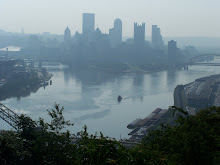Mon., July 14
This week we’ve been focusing on “work songs” which our first speaker of the week, Norm Cohen (author of “Long Steel Rail”), broke up into two categories: work songs (that is, songs sung during work) and occupational songs (songs about work). A lot of the early American work songs were sung while building railroads, first widely used in the 1830’s and reaching their peak use in the 1920’s; railroads changed the landscape and pace of American life. Railroads are an awfully efficient mode of transportation and despite the Truman administration’s efforts to do away with the railroad, the railroad endures. The railroad was an important part of the Union’s victory during the Civil War because they were able to ship supplies to the soldiers and bring home dead bodies; and Northerners were able to lay the railroad tracks about as quickly as the Southerners tore them down.
The early work songs were sung primarily by African-Americans who were sometimes incarcerated and put to work in a form of legalized slavery. These early railroad songs are documented in Alan Lomax’s video on this tradition. The new immigrants during the 19th-century, the Irish, sang occupational songs which expressed hostility toward another immigrant group—the Chinese---who also worked to lay down tracks. The Chinese were known to have a good work ethic and as a result were highly despised and resented by the Irish.
Because it represented big business, the railroad companies and the conductor who represented the authority of the railroads were vilified in popular media of the day. For example, in the song “The Lightning Express”, the rider of the railroad begs, “Please, Mr. Conductor, don’t put me off this train.”) There was actually public sympathy for the train robber Jesse James. Because of their antagonism for the railroad, the public didn’t mind Jesse James stealing from the railroad which transported money and other goods. Cohen made the distinction between hobos, tramps, and bums which I thought was kind of interesting. “Hobos” he said were migratory workers. “Tramps” were migratory non-workers. And “bums” he said were stationary non-workers.
The song “Casey Jones” tells the story of a famous train wreck in the 1920’s where a couple of the cars on a train came loose and another train, going way past the speed limit, did not see it in time.
Another great song is “John Henry” which goes “Johnny going to be a steel driving man”. This song speaks of the dignity of labor and of the replacement of man with technology. There is a wealth of educational material on the figure of John Henry with a Caldecott award winning book entitled “John Henry”, a video narrated by Denzel Washington, a book entitled “Ain’t Nothing but a Man: My Quest to Find the Real John Henry”, and “Tall Tales”, an animated movies with Patrick Swayze.
Monday, July 21, 2008
Subscribe to:
Post Comments (Atom)

























No comments:
Post a Comment